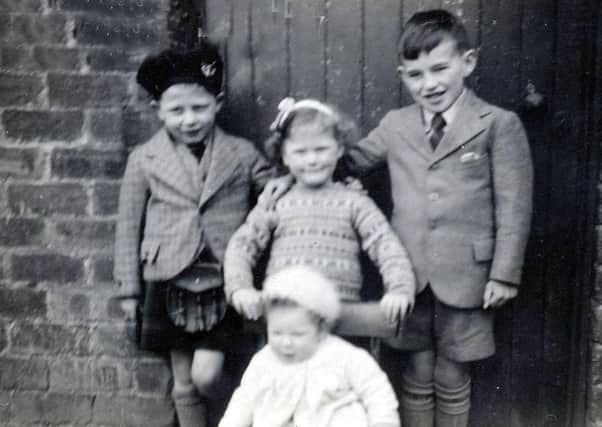Nitten sites were seen as possible bombing targets


I was obviously too young to appreciate Prime Minister Neville Chamberlain’s message on the morning of September 3, 1939, that we were now in a state of war with Germany.
It was not long, however, before I became aware of changes such as the “Blackout” regulations, for instance. We had a gas street light just outside the front door of my Dad's shop, now the hair stylists at 126 Main Street, Newtongrange. The lamplighter no longer came round just before dark to open one of the glass panels of the light fitting and turn on the gas with his “lamplighter's pole”. Newtongrange and surrounding area, at that early stage in the war, was considered as a more than possible target.
Advertisement
Hide AdAdvertisement
Hide AdThe local collieries of Lady Victoria, Lingerwood, Easthouses Mine, the Gore and Emily collieries, plus the oil well at D’Arcy, the Gas Works at the White Gates, and proximity of the LMS main railway line were thought significant targets. There weren't many air raid shelters in Newtongrange that I can recall, however, since the cellar beneath my Dad's shop had a reinforced ceiling, this, along with the insertion of a Dorman “H” section girder running from one end of the building to the other, at shop ceiling level, (that can still be seen today in the ceiling of the shops and bank), was deemed strong enough to be a shelter.
This then became the Air Raid Shelter for ourselves, our next door neighbours, the Cochrane family, along with the Burnetts, Paxtons’ and Darges’ from the opposite side of the Main Street. The cellar had been intended as a storage for the bake house (now converted to a house), but being wartime there was precious little to store.
We had a Marconi wireless, driven by an accumulator and a grid bias battery, with an aerial wire run out through an air vent in the cellar. I had a bed made up on one of the shelves, and I can recall on a number of occasions listening to the 9 o’clock news from the BBC Home Service whilst being in the “shelter”. School was not all strict academic learning. We had P.T. (Physical Training) every day. It took the form of constant movement games such as “Squadron Leader” where you would be split into teams of four, with a nominated leader. The idea was that you “Took Off” and followed your leader, arms had to be extended fully out to the side, thumbs pointing forward as “guns”. Once you were “airborne” you could not stop, if you did you were deemed to have crashed and out. Your leader had to be followed and you had to avoid other squadrons, contact would result in “aircraft damage”. This would continue for at least five minutes or more, at a pace of a trot as a minimum speed, if you slowed down, you were adjudged as entering a stall and crashed.
Another was called “the Battle of Britain”. Here you would have a piece of material stuck in the rear of your waistband. It was a free for all. The idea was that you had to stop someone pulling the material out of your waistband, while you went after anyone to get their “tail”. Again, this could go on for a long time, anyone capturing five or more tails was an ACE.
Advertisement
Hide AdAdvertisement
Hide AdThe Palace Cinema, or “the Picture House” as it was known, was the venue for the Saturday matinée, the weekly highlight. With no sweeties to be had, you would be given three pennies for the occasion. The first one was spent at “Jenny Scots”, the greengrocer shop at the apex of the corner between the Main Street and Murderdean Road, now a beauty salon. Here you could buy two carrots, then join the queue for the “pictures” and spend the waiting time scraping the outside of the carrots with one of the remaining two pennies. The lady in the ticket booth was not always pleased to get pennies soaked in carrot juice, she claimed it “gummed up” the ticket machine.
During 1940 my parents and grandmother became guardians to two of my cousins who were evacuated from London. One of my Mother's younger sisters had married a Dalkeith policeman, Bill Steele, a few years before the war started. He transferred to the Metropolitan Force in 1938 moving to Wray House in Chelsea.
When the war started many children in the south were evacuated for their safety, away from the bombing. Isabel and Jim Steel, their children, were brought north to Eighth Street to stay with their Granny. Ironically later in the war, they went back to London as bombing raids had stopped. They arrived just in time for the V1 (Doodlebug) and V2 rockets raids instead.
In 1941, Newtongrange Scouts trekked south to Heriot, where they had the use of a field and a derailed cattle wagon. During the first night of the camp, an enemy aircraft was heard overhead. It appeared to be circling, probably lost and attempting to orientate itself. Having with no success it jettisoned its bombs, which fell close to Heriot, fortunately missing the campsite. A story that was still being related when I joined the Wolf Cubs in 1944.